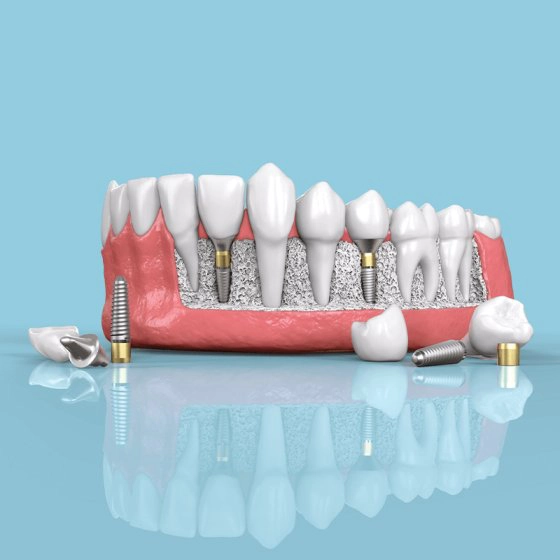Home/Wellness Zone/Sakra Blogs
2nd Apr, 2021

People suffer tooth loss due to many reasons - tooth decay, periodontal disease, or oral injury. What a lot of patients do not understand is that missing teeth are not just cosmetic issues, they also affect overall dental health and day-to-day activities. Tooth loss causes changes in the way we chew, and even talk. Additionally, without an intact and secure tooth root, the jaw can weaken, shrink and cause the lips and cheeks to sag.
In such a scenario, Dental implants have popped out to be a smarter choice.
What are Dental Implants?
Dental implants are a replacement for tooth roots. It is a metal fixture, similar to that of a screw, that is surgically fastened to the jaw, under the gum line on which artificial teeth can be mounted. These metal implants become anchored to the bone through osseointegration (the bone fuses to the metal).
What Are the Advantages of Dental Implants?
Improved appearance
Dental implants are fused with the bone, and they look and feel like your own teeth.
Improved speech
Compared to dentures, dental implants allow you to communicate confidently. With ill-fitting dentures, teeth can slip within the mouth causing you difficulty in speaking.
Improved chewing
Since dental implants function like your own teeth, chewing and eating feels comfortable and normal.
Improved self-esteem
A missing tooth can hamper your self-esteem. But dental implants can lift it up and give you back your smile.
Long-lasting results
If taken good care of, implants can last many years.
Can Anyone Get Dental Implants?
Dental implants could be performed if you:
have one or more missing teeth
have a jawbone that's reached full growth
have healthy oral tissues
have a good overall health condition which will not interfere with bone healing
Do not want to opt for dentures
Types of implants
There are 3 types of implants:
Endosteal implants
These are the most common type of dental implants which are generally advised for most patients. They are made of titanium, shaped like screws and are surgically implanted in the jaw bone. Once the gum tissue surrounding the dental implant is healed, a second surgery is needed to connect the post (abutment) on the implant. Finally, an artificial tooth (or crown) is placed on the extension of the post.
Having these implanted, will require you to have a good, healthy jawbone.
Subperiosteal implants
These implants consist of a metal frame and are an alternative to endosteal implants, but not as common as endosteal implants. They are placed onto the bone rather than into the bone, just below the gum tissue. In time, the frame gets fixed to the jawbone. Then the artificial tooth (or crown) is then mounted onto the post.
This type of implant is advised to patients that have a weak jawbone or do not have enough jawbone space for an implant.
Dental Implants Procedure
The entire dental procedure would be as follows, although there might be some minor additions based on each patient and the case:
Initial Evaluation: This includes, X-rays, taking impressions, and matching the colour of the teeth to make your implant look as natural as possible. This evaluation is also done to determine the condition of the jawbone.
Extracting the damaged tooth: Before an implant can be inserted, the damaged/decayed tooth will be extracted.
Bone graft examination: Your jaw and the surrounding bone has to be strong. Hence, the dentist needs to examine if a bone graft is required to make sure the jaw can support the dental implant. If required, bone grafting is performed and the bone is allowed to heal before inserting the implant.
Inserting the implant: A dental surgery is performed to prepare the jaw for the insertion of the implant. Thanks to modern dentistry techniques, it’s possible to carry out the implant placement procedure comfortably and with lesser pain. The implant is then placed deep in, just like the root.
Attaching the abutment (base of the crown): The metal part that serves as a base for the crown in the dental implant is called as an abutment. It acts as a connector, with one part attached to the jawbone, while the crown is fixed on the other end. After the recovery, one more small surgical procedure is conducted by the dentist to add the abutment to the implant. This recovery takes a few weeks.
The procedure could take well over 3-6 months or less depending on the healing process. It is very important to maintain oral hygiene throughout all the steps of the treatment to make sure healthy teeth and healthy gums.
Looking for dental implants in Bangalore, then contact Sakra World Hospital where you will get the best treatment and care.
How to take care of dental implants?
Physical exercise or activity immediately after surgery has to be avoided
Apply ice packs to reduce swelling.
Stay hydrated and consume liquids. Avoid food that is hard and puts extra pressure on the teeth.
Floss regularly after a few days of surgery
Rinse using warm saltwater
Use low-abrasive toothpaste
Brush under and around the implant crown
These are a few tips that you should follow to care for your dental implants. There are additional steps you would have to follow immediately after the surgery which your dentist will inform you of accordingly. If you get dental implants at Sakra World Hospital, we will be sure to help you with all the pre and post-care treatment. For more information about receiving dental implants at Sakra World Hospital, contact us today.
Sakra World Hospital has the best dentist in Bangalore experienced in treating any kind of dental conditions. For the best dental implants in Bangalore consult the best dental hospital near you.
Enquire Now
